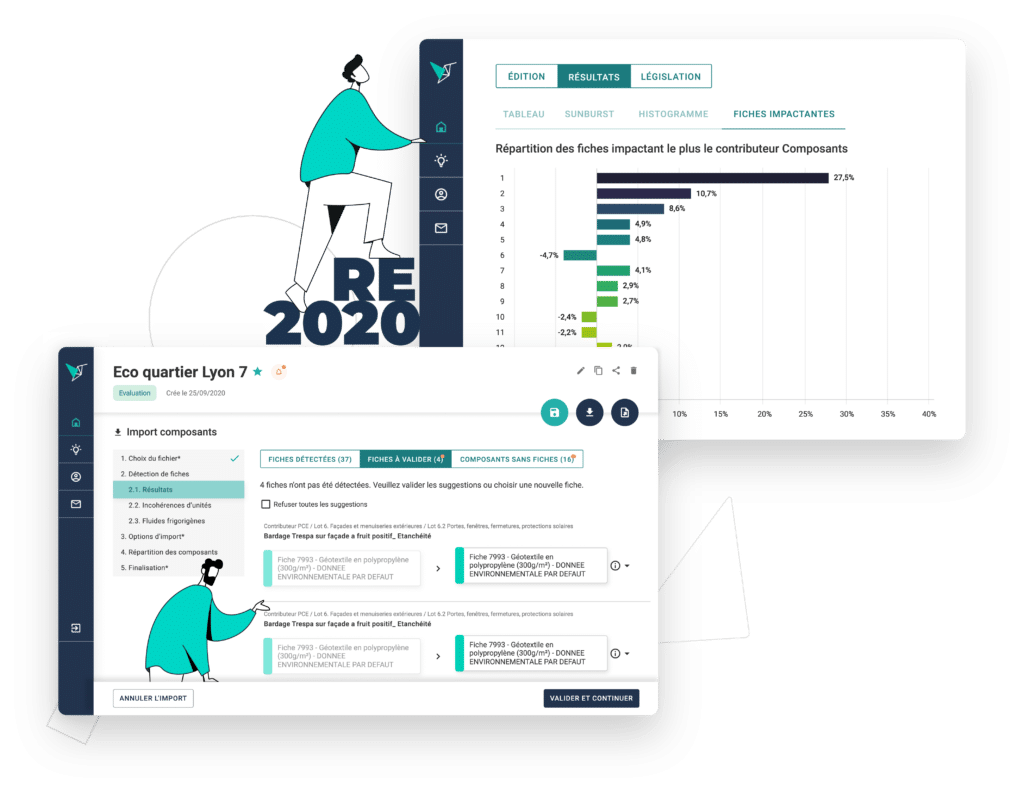Qu’est-ce que la base INIES ?
Depuis 2004, INIES est la base de données nationale française de références sur les données environnementales et sanitaires des produits et équipements de la construction.
Quel est son rôle ?
Pourquoi la mise à disposition d’ une base de données des FDES et des PEP est-elle importante ?
Les FDES et les PEP sont les documents qui permettent de mesurer la performance environnementale d’un produit de construction. Ils sont élaborés sur la méthodologie de l’Analyse du Cycle de Vie (ACV) et permettent d’évaluer l’impact carbone d’un projet de construction sur 100 ans, ainsi qu’imposé par l’entrée en vigueur de la Réglementation Environnementale 2020 (RE 2020).
Ces fiches permettent aux acteurs du BTP engagés dans la construction durable à réaliser des programmes et des projets vertueux, et à réaliser de l’écoconception.
Quelles sont les programmes et services proposés par INIES :
INIES propose deux programmes de vérifications de données environnementales conventionnés par l’Etat Français :
- Le programme de vérification INIES : C’est le programme français de vérification des déclarations environnementales, spécifique aux produits de construction. Il permet aux fabricants d’élaborer et de publier des FDES et ICV (Inventaires du Cycle de Vie). Dans ce cadre, INIES rédige les règles du programme de vérification, habilite les vérificateurs des FDES et ICV, et gère les réclamations et l’enregistrement de ces documents.
- Le programme de vérification PEP ecopassport® : C’est le programme international de vérification des déclarations environnementales des produits électriques, et de génie climatique permettant aux fabricants l’élaboration et la publication de PEP.
INIES propose également un webservice (une application qui permet d’échanger des données avec d’autres applications web) :
- Le webservice INIES permet d’alimenter les logiciels d’ACV bâtiment avec les données numérisées dans INIES. Mis en place en 2013, le webservice d’INIES offre la possibilité d’accéder à une grande partie du contenu des déclarations environnementales au format numérique.
Qui est le propriétaire d’INIES ?
Alliance HQE-GBC : L’alliance des professionnels pour un cadre de vie durable. Elle réunit syndicats, fédérations professionnelles, sociétés, collectivités et professionnels à titre individuel du bâtiment, de l’aménagement et des infrastructures. Membre français du World Green Building Council (World GBC).
Quels sont les acteurs impliqués dans le fonctionnement d’INIES ?
Le fonctionnement de la base de données est assuré par le conseil de surveillance et le comité technique.
- Le Conseil de Surveillance est présidé par l’Alliance HQR-GBC, est garant de l’éthique et la déontologie de la base. Elle en définit la politique générale, approuve les modifications apportées au fonctionnement de la base et gère les actions de communication.
- Le Comité technique : présidé par l’AIMCC, il veille à la collecte, au traitement des données, et à l’actualisation du contenu.
Qui sont Les membres d'INIES ?
AFNOR (Association Française de Normalisation) : Une organisation qui anime et coordonne le processus d’élaboration des normes et promeut leur application.
AIMCC (Association française des Industries des produits de Construction) : Une association regroupant les syndicats et fédérations qui représentent les industriels fabricants de produits entrant dans la construction (matériaux de gros œuvre et de second œuvre, composants, équipements et systèmes, etc.).
CAPEB : (Confédération de l’Artisanat et des Petites Entreprises du Bâtiment) : Le syndicat des patrons de l’artisanat de l’ensemble des entreprises du bâtiment.
CSTB (Centre scientifique et technique du bâtiment) : Cet établissement public qui effectue de nombreuses missions, allant de recherche à l’évaluation à propos des produits de construction, des bâtiments et de leur intégration en zones urbaines.
DHUP (Direction de l’Habitat, de l’Urbanisme et des Paysages)Au sein du Ministère chargé du logement et de l’environnement, cette direction élabore, anime et évalue les politiques de l’urbanisme, de la construction, du logement, du paysage, de la biodiversité, de l’eau et des substances minérales non énergétiques.
EGF BTP (Entreprises Générales de France BTP) : Syndicat des Entreprises Générales du BTP reconnues pour leur approche globale, innovante et durable de l’acte de construire.
FFB (Fédération Française du Bâtiment) : Une organisation qui représente et accompagne entreprises de bâtiment, dont plus de la moitié de taille artisanale. La FFB organise un maillage territorial, à l’échelle départementale et régionale ainsi qu’à travers les syndicats de métiers.
Association PEP Ecopassport® : Une association de fabricants qui est l’opérateur international de programme de déclaration environnementales dédié aux équipements électriques, électroniques et de génie climatique, conventionné avec l’Etat.
Qualitel : Une association indépendante à but non lucratif dont la mission est de promouvoir la qualité de l’habitat. Pour cela, Qualitel mène des opérations d’information à destination du grand public, de certification des logements, de recherche, d’évaluation et d’expertise et de formation professionnelle des acteurs du bâtiment.
USH (Union Sociale pour l’Habitat) : qui rassemble des fédérations nationales et associations régionales d’HLM. L’USH informe les organismes et sensibilise les publics.
Découvrez nos logiciels Vizcab pour certifier et labéliser vos projets de construction bas carbone
De la phase de diagnostique et faisabilité à la phase d’exécution d’un projet de construction, nous vous proposons des logiciels adaptés pour chaque professionnel pour bâtir votre stratégie bas carbone.



En phase amont
Dès l'esquisse, sécurisez l'objectif coût / carbone de vos projets.
Optimisez votre rentabilité d’un projet en jouant sur les paramètres les plus impactants pour atteindre vos objectifs et fédérez les acteurs grâce à des supports de communication percutants.

En phase aval
Calculez et optimisez l'impact environnemental de vos projets
Vizcab Eval la solution pour vous permettre de produire des études ACV bâtiment fiables, robustes et percutantes en un minimum de temps.
